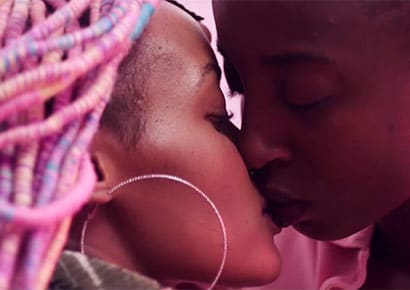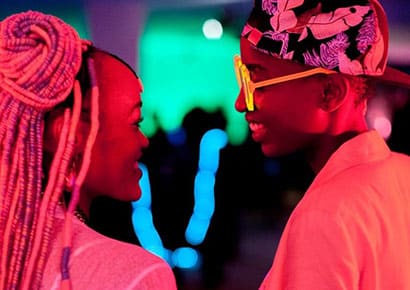Kenyan lesbian film ‘Rafiki’ banned ahead of Cannes debut
 Kenya’s notoriously homophobic censors have banned a Kenyan lesbian love story after it was invited to premiere at the Cannes Film Festival next month.
Kenya’s notoriously homophobic censors have banned a Kenyan lesbian love story after it was invited to premiere at the Cannes Film Festival next month.
Despite the honour – a first for Kenya – the Kenya Film Classification Board (KFCB) announced that Rafiki (meaning ‘friend’) will not be allowed to be shown in its home country.
In a statement, KFCB CEO Ezekial Mutua said the film had been banned “due to its homosexual theme and clear intent to promote lesbianism in Kenya contrary to the law.” Anyone who screens or distributes the film or is found in possession of a copy will face “severe penalties”.
(Mutua was ridiculed last year after he demanded that two male lions seen having sex in a national park get counselling for their “abnormal behaviour”. He also suggested that the lions may have ‘learned to be gay’ after possibly watching a gay human couple having sex in the park.)
Under the KFCB classification, Rafiki was deemed to include “homosexual scenes that run counter to the law, the culture and moral values of the Kenyan people” with the intention to “legitimise lesbianism in Kenya.”
Mutua revealed that the film’s director had been offered the opportunity to “remove the offensive classifiable elements and resubmit it for reclassification.” She, however, refused to do so.
He also accused the producers of submitting a script for approval ahead of its production, as required by law, which, he claimed, did not include the lesbian scenes or themes. Mutua threatened to pursue “legal means to hold the producers accountable for making material alterations to the script.”
He went on to insist that “films made in Kenaya for public consumption must reflect and respect the dominant values of the Kenyan society. Any attempt to introduce and normnalise homosexuality flies in the face of the law and the constitution and must be resisted.”
 Mutua concluded by warning foreigners against providing funding or support towards making films that “undermine the sensibilities of the Kenyan people”. The film is understood to be a co-production with South Africa and received a ‘Best Feature Film Project’ award at the 2012 Durban FilmMart while it was in development.
Mutua concluded by warning foreigners against providing funding or support towards making films that “undermine the sensibilities of the Kenyan people”. The film is understood to be a co-production with South Africa and received a ‘Best Feature Film Project’ award at the 2012 Durban FilmMart while it was in development.
The film’s director Wanuri Kahiu told Reuters that she was disappointed by the ban. “Kenyans already have access to watch films that have LGBT content, on Netflix, and in international films shown in Kenya and permitted by the classification board itself.”
“So to then just ban a Kenyan film because it deals with something already happening in society just seems like a contradiction,” she said.
Rafiki is based on the award-winning short story Jambula Tree by Monica Arac de Nyeko. It has been described as a coming of age story about two Kenyan girls who fall in love and whose desire for each other flies in the face of African conventions.
The KFCB is known for banning films, music videos and TV shows that affirm the LGBT community. In November, the board forced pay-TV network MultiChoice to ban the Disney teen series Andi Mack, which contains a gay character. That ban effectively also restricted the series from being shown by MultiChoice on the rest of the continent.
Homosexuality is outlawed in Kenya, with penalties including five to 14 years in prison. There is, however, a legal challenge in the courts underway to repeal these sections of the Penal Code as unconstitutional.
Leave a Reply